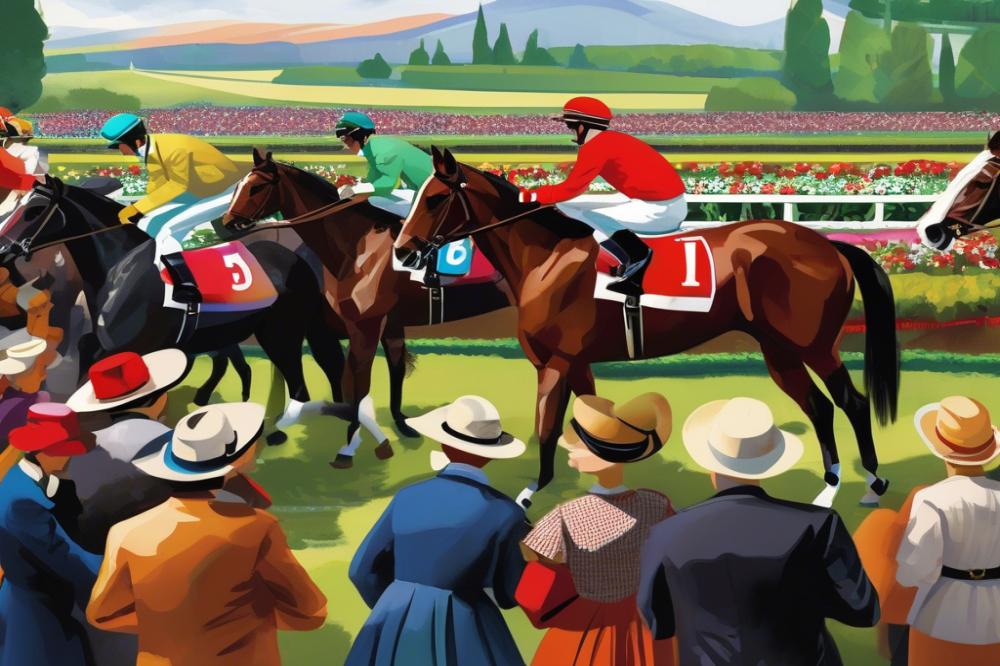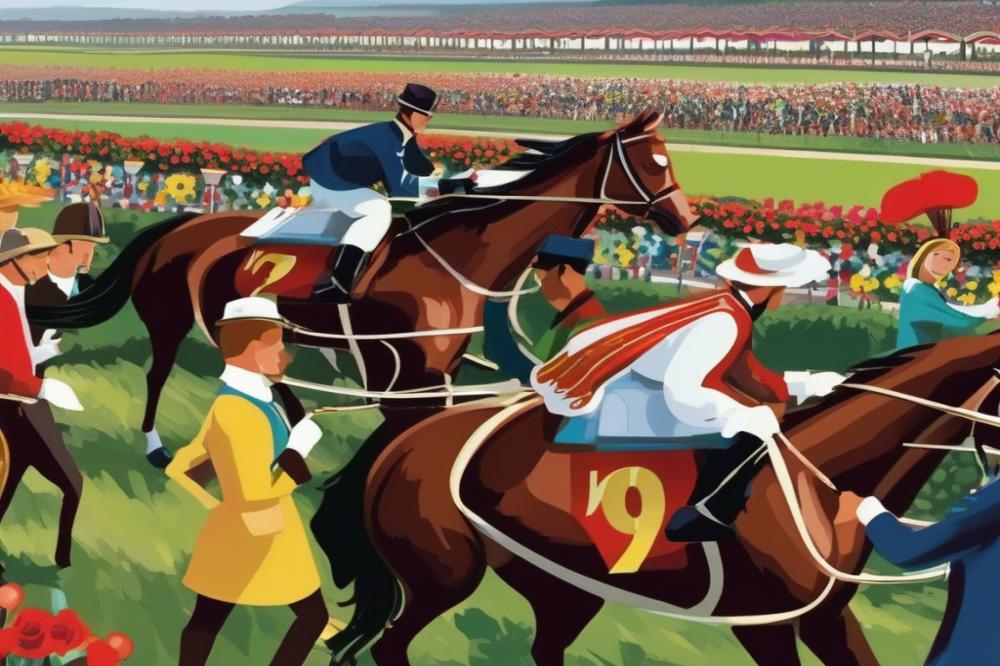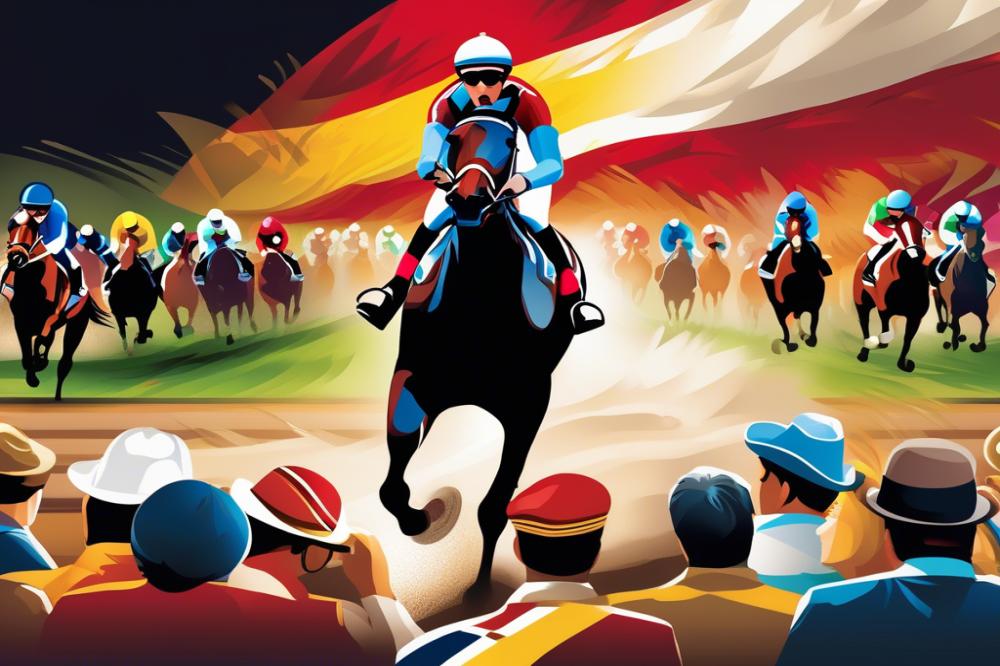Introduction
Horse racing in Germany has a rich history and holds a special place in the hearts of many fans. This sport combines excitement and tradition, drawing crowds to racecourses across the nation. From the vibrant atmosphere at tracks to the elegance of the racing industry, horse racing is woven into the cultural fabric of Germany.
Currently, the state of horse racing in Europe reflects both challenges and opportunities. While countries like the UK and France enjoy immense popularity, Germany struggles to capture the same level of enthusiasm. Changes in society and entertainment preferences have influenced the appeal of this age-old sport.
This article explores the #main_keyword# and its significance in understanding the future of racing in Germany. A detailed examination will highlight past trends and future possibilities. There’s much at stake for the sport’s survival. With shifting interests among younger generations, adapting is key. What does the future hold for horse racing? Engaging with this question can provide insights into its potential revival.
As we discuss the sport’s journey, we will delve into how racing has become part of broader discussions about entertainment and leisure. Innovation and change are critical as the industry seeks to attract new audiences. Stay tuned as we uncover valuable perspectives on this fascinating topic, leading us to think: what’s next for horse racing?
We will explore various factors influencing its popularity and consider initiatives to rejuvenate interest. This journey will include looking at success stories and challenges within Germany’s racing landscape. Change is a constant theme in sports. What role will that play for horse racing? We will find answers as we move forward.
Moreover, this examination raises important questions about tradition versus modernity. Relying solely on historical significance might not be enough to keep the sport alive. Various stakeholders, from fans to sponsors, must come together for a positive transformation. In this complicated yet thrilling world, the next chapter is waiting to unfold. The key lies in adaptability and understanding audience needs.
As we engage with themes of growth, decline, and renewal, let’s step into the future of horse racing in Germany. There’s a lot to consider. Insights from different perspectives will enrich our understanding. Perhaps a fresh approach can breathe new life into this beloved sport. With that in mind, let’s dive deeper into the current landscape and explore what lies ahead.
As we examine these developments, it is essential to reference some key aspects of the horse racing industry. There is a need to overcome challenges and redefine the sport’s identity. A vibrant discussion awaits, promising a unique journey through the rise and fall of horse racing in Germany. Let’s uncover the layers behind this sporting phenomenon and look at how it reflects broader changes in society. There is much to learn, and every detail matters.
The Rise of Horse Racing Popularity in Germany

Horse racing has deep roots in German history. The tradition can be traced back several centuries. It began gaining traction in the late 18th century. Initially, it was an activity for the elite. Over time, it started to capture the attention of the general public.
Key developments fueled its popularity. The establishment of the first organized races helped lay the foundation. In 1869, the German derby made its debut in Hamburg. This event quickly became a highlight of the racing calendar. People flocked to witness the excitement, and the spectacle grew over the years.
Notable races played a significant role as well. The 1925 Deutsches Derby became a landmark occasion. Crowds gathered not only for the competition but also for the social atmosphere. Festivals surrounding these events further enhanced public interest. Families would spend entire days enjoying the festivities, making it a cultural experience.
Horse racing found its niche in German sports culture. Its allure was not just in the thrill of the race. It provided a sense of community and tradition. Fans would gather at tracks, cheering on their favorites. The sport fostered connections among people from different backgrounds. This unique blend of excitement, community, and tradition has captured the hearts of many.
In recent years, horse racing has faced challenges. However, its legacy and historical roots continue to shape its identity. The spirit of competition remains alive despite fluctuations in popularity. As Germany looks to the future, the sport might evolve again, finding new ways to engage its audience.
Factors Contributing to the Decline of Horse Racing

Economic challenges have significantly impacted the sport. In recent years, funding for horse racing has diminished. Many racecourses have struggled to remain profitable. This financial strain has made it difficult to attract new investors and maintain existing facilities.
Competition with other forms of entertainment also plays a role. Sports like football and basketball draw larger crowds and sponsorships. Younger audiences prefer video games and streaming services over traditional racing. These shifts in leisure activities have siphoned interest away from horse racing events.
Public perception has changed, too. Once seen as a glamorous pastime, horse racing now faces scrutiny. Concerns regarding animal welfare have risen among fans and critics alike. Many individuals question the ethics of horse racing practices. This growing awareness may deter potential spectators who would otherwise enjoy a day at the races.
Demographic shifts further complicate the landscape. As society evolves, interests and values transform, leading to changes in participation. Younger generations often seek more interactive and engaging experiences. Horse racing may seem less appealing when compared to modern alternatives like esports and immersive activities.
Regulations continue to tighten around horse racing. Rules aimed at improving animal safety have created additional burdens for operators. Maintaining compliance can be costly and time-consuming. Often, these adjustments result in reduced racing days or higher fees, which can dissuade participation. As a result, fewer owners and trainers remain involved in the sport.
Overall, multiple factors converge to influence the decline of horse racing in Germany. Competing entertainment options, financial pressures, changing attitudes, and regulatory challenges have all contributed to this trend. The future of horse racing faces uncertain waters.
Comparative Analysis: Horse Racing Trends in Europe
Horse racing has a rich history across Europe, yet its popularity has taken varying paths. In France, for example, the sport remains a significant spectacle. Many people flock to tracks like Longchamp to witness prestigious events. The French have mastered the integration of glamour and excitement, which keeps audiences returning. Races are often accompanied by social gatherings, making each event a lively occasion.
In contrast, the UK has its own take on the issue. British horse racing enjoys a strong tradition, with famous events like the Grand National drawing large crowds. However, the sport faces challenges similar to those in Germany. A noticeable decline in younger viewers raises concerns among racing officials. The British Racing Authority is actively seeking ways to engage new generations. This includes using social media platforms and innovative marketing strategies. They aim to attract a fresh audience, hoping to plug the gap left by the older demographic.
Germany’s situation bears resemblance to both France and the UK. Despite its storied past, the sport has seen dwindling numbers. Spectators are often older, and the appeal does not seem to reach younger fans. Similar to their neighbors, German racing organizations are brainstorming solutions. Some are looking at the French model, which incorporates entertainment alongside traditional races. Germany could benefit from adapting more versatile approaches to create exciting events.
Challenges, however, are not limited to Germany. Across Europe, horse racing faces the need for modernization. Countries are aware that new technologies can enhance the experience. Online betting and streaming services become essential for connectivity. This shift might help re-engage audiences who prefer watching from home. Efforts to innovate could be the lifeline the sport requires.
Additionally, sponsorship has become a key factor in driving interest. France and the UK have capitalized on partnerships with major companies to boost revenue. This is crucial for developing the horse racing scene. Germany might consider similar partnerships to secure financial support. Thriving sponsorships could lead to improved facilities and more extensive marketing. All these changes may foster a renewed interest in the sport.
What’s Next for Horse Racing in Germany?
Revitalizing horse racing in Germany requires fresh ideas and strategies. Connecting with younger audiences is key. Waiting for interest to grow on its own is not an option. Instead, embracing modern trends can help pull in the next generation.
Innovations in race events could excite potential fans. Organizing themed race days, such as festivals with music and food, may attract a crowd that doesn’t usually attend. Additionally, making entry to races more affordable might encourage families to come out. A fun atmosphere can turn a casual event into a memorable experience.
Digital platforms hold great potential for promoting the sport. Creating engaging social media content can reach a broader audience. Interactive apps could also allow fans to follow horses, jockeys, and even place virtual bets. Establishing live streams of races could make it possible for fans to stay connected from anywhere.
Collaborating with other sports is another promising angle. Partnering with popular sports events, like football matches or festivals, can introduce horse racing to new fans. Offering joint promotions or package deals may entice visitors to try something different. Community involvement is essential, and partnerships can foster a sense of excitement around the sport.
Furthermore, focusing on storytelling can create deeper connections. Highlighting the stories of horses and jockeys can resonate with viewers. Engaging stories can captivate a wider audience. Fans enjoy learning about the history and personalities behind the races.
Educating newcomers about the sport is crucial. Organizing workshops or school visits can help demystify horse racing. Explanations about how races work and the care of horses can build respect for the sport. Ultimately, creating a youth-friendly image can help the industry flourish.
Looking Ahead: The Future of Horse Racing in Germany
The rise and fall of horse racing popularity in Germany tells a compelling story. Once a cherished pastime, the sport captivated many with its thrilling races and elegance. However, over the years, interest has waned. Factors like changing entertainment preferences and newer leisure activities contributed to this decline. Still, the return to roots could be the answer to reviving the sport.
Challenging days lie ahead for horse racing. Yet, there remains a glimmer of hope. With a focus on modernization and fan engagement, the industry has the potential to attract a fresh audience. Efforts to incorporate technology into the experience can transform how people interact with the races. From live streaming to social media engagement, new strategies can draw in younger fans. The culture surrounding the sport might shift, but it has the tools to evolve.
Equally important, horse racing has a rich history in Europe. It connects to traditions and memories that many cherish. This cultural significance is something organizers can leverage to reignite interest. Tying races to festive events and local traditions can create a unique atmosphere. It would encourage communities to partake in this age-old spectacle once again.
Ultimately, the path forward for horse racing in Germany requires innovation and flexibility. Stakeholders must recognize the changing landscape of entertainment and be ready to adapt. Collaboration within the sport, along with community involvement, can strengthen ties and foster engagement. #anchor_text_3# should become a rallying point for enthusiasts, while #anchor_text_4# serves as a reminder of the sport’s storied past.
In summary, while horse racing may have faced challenges in recent years, the future is not bleak. By learning from past mistakes and embracing change, there is a real chance for a resurgence. The excitement that racing brings can once again captivate audiences if approached with creativity and passion. The journey ahead may be uncertain, but it is also filled with potential.



